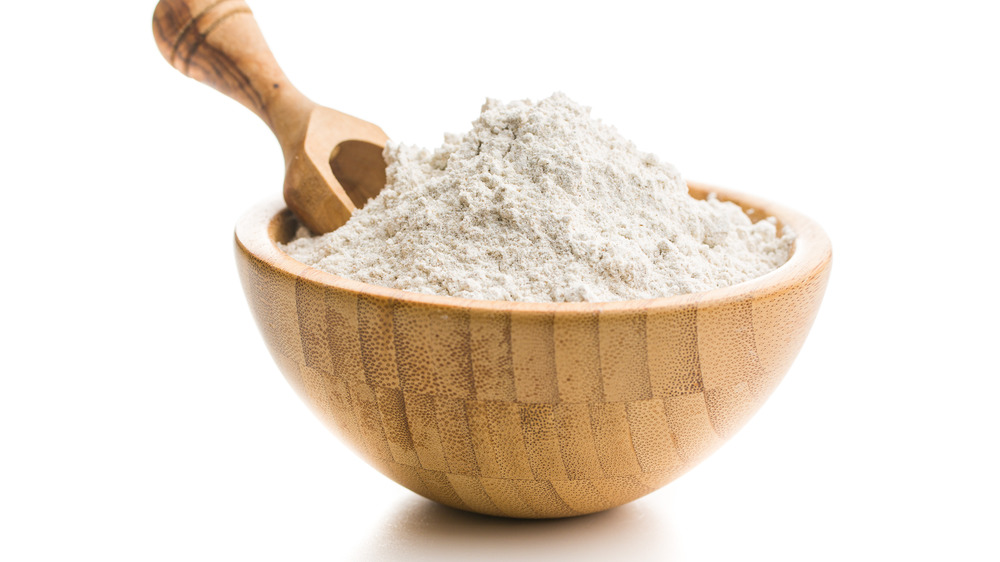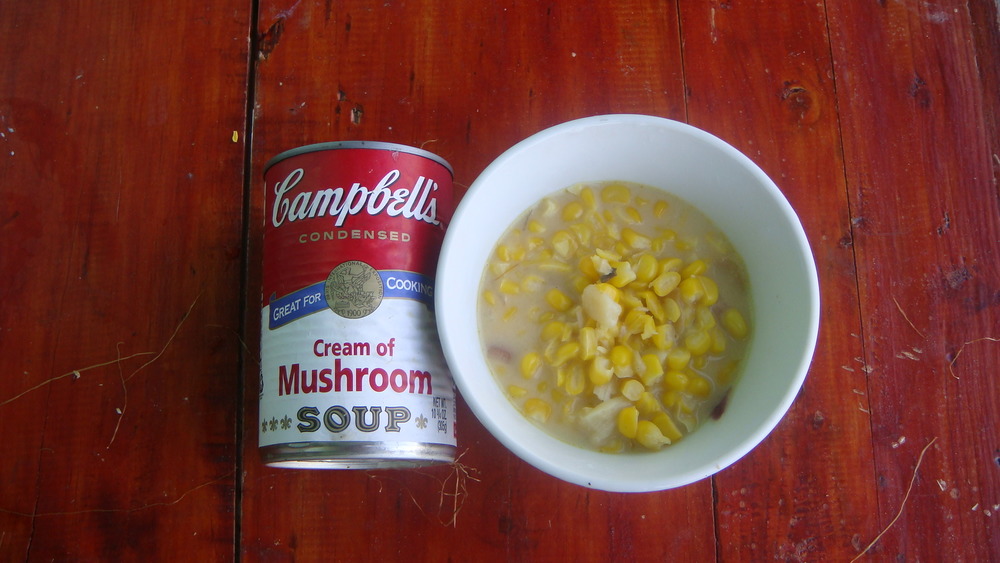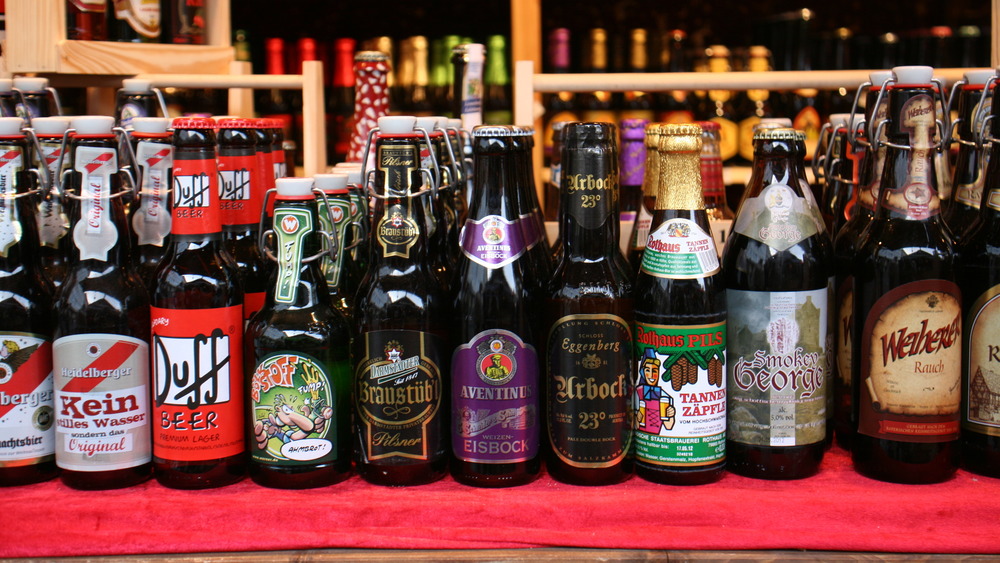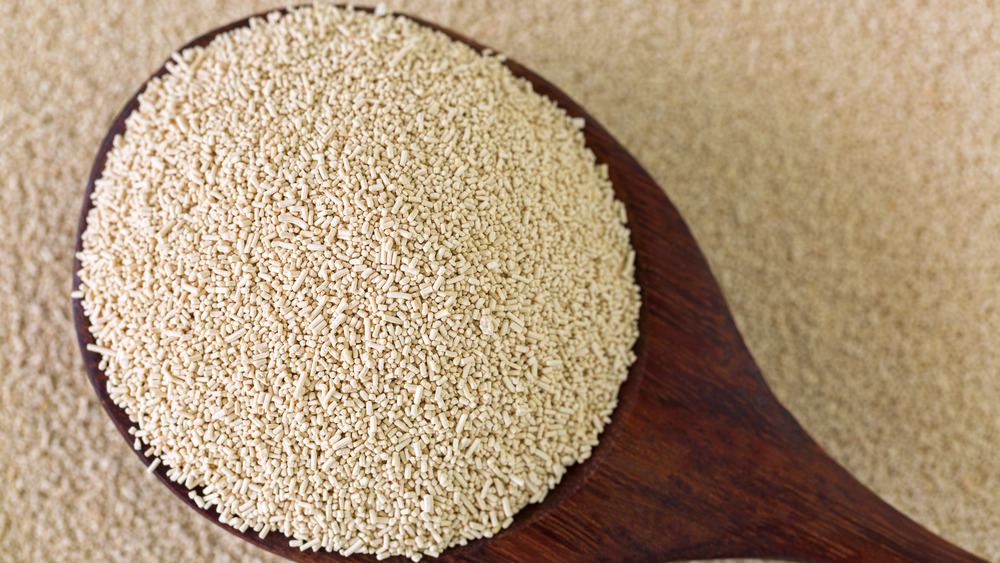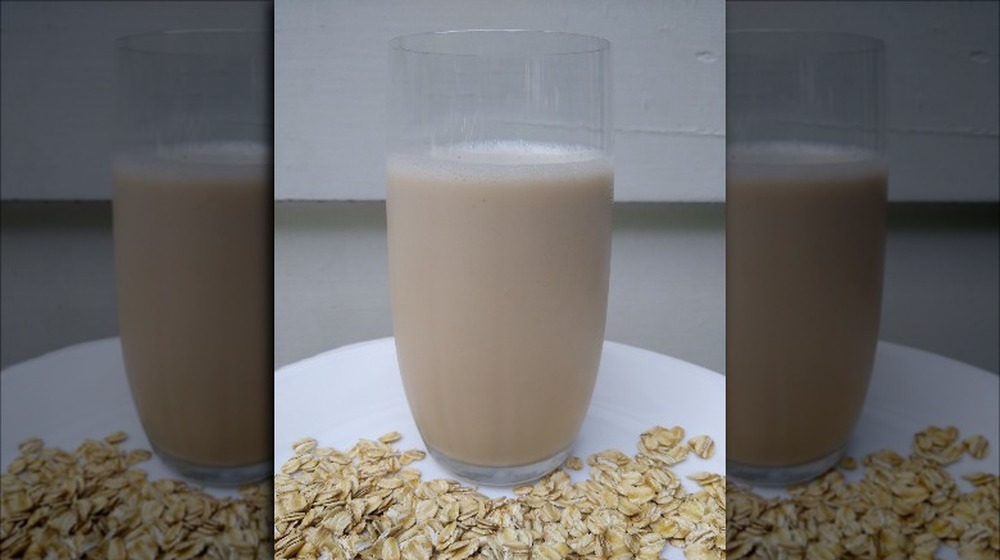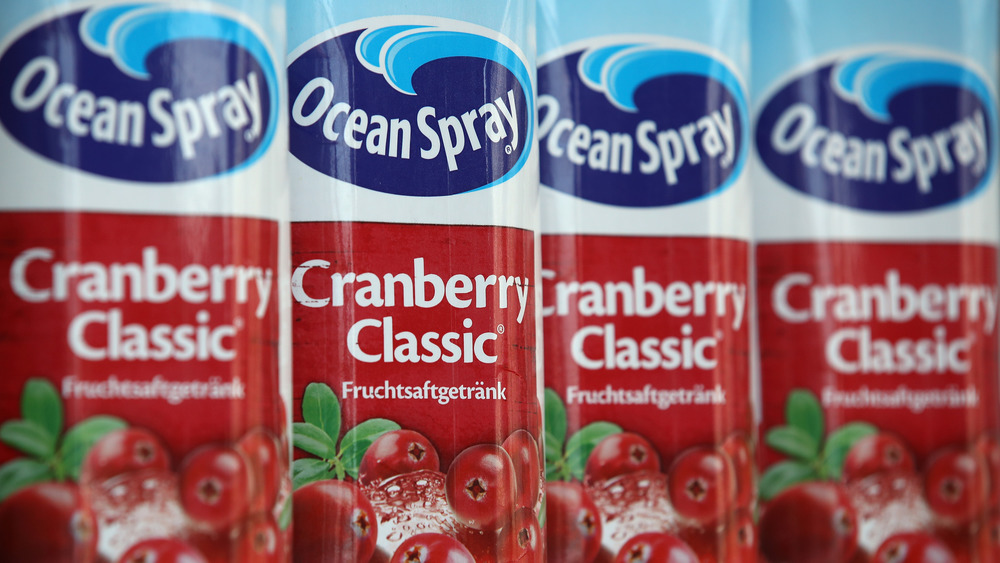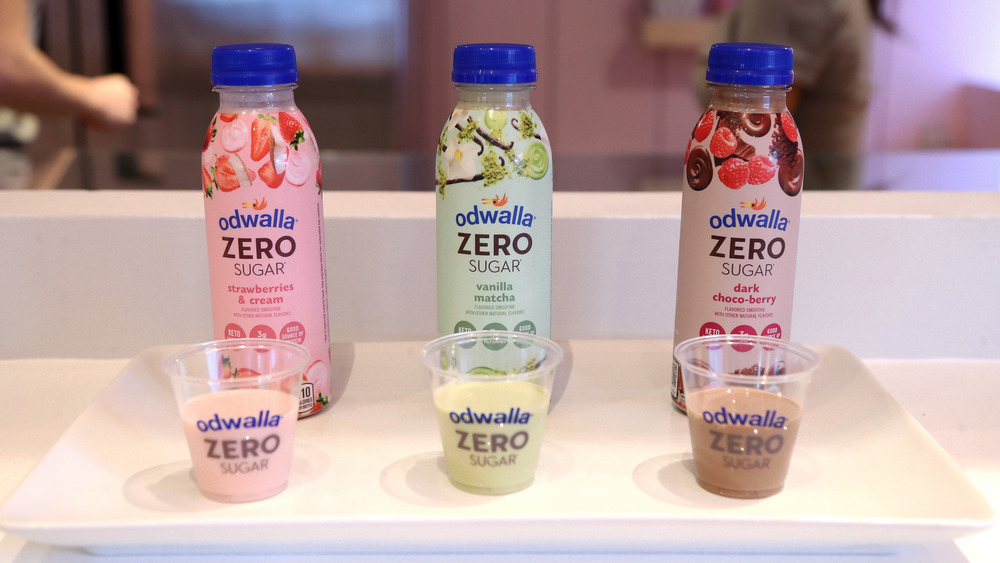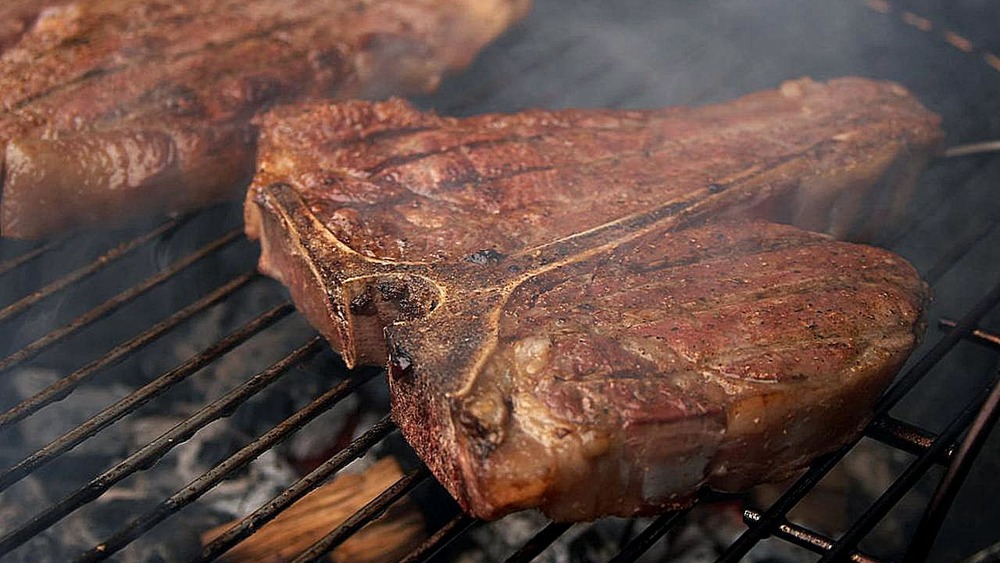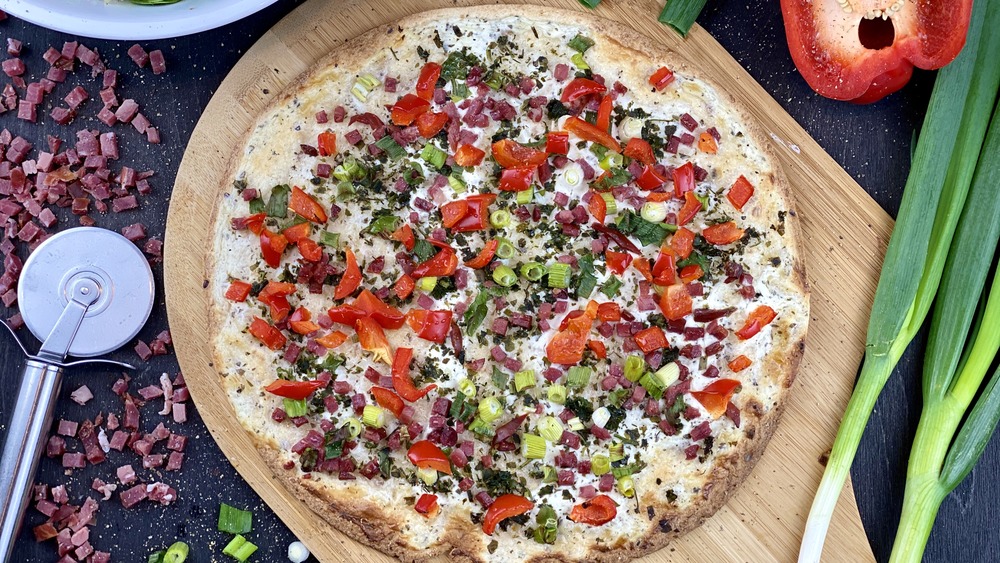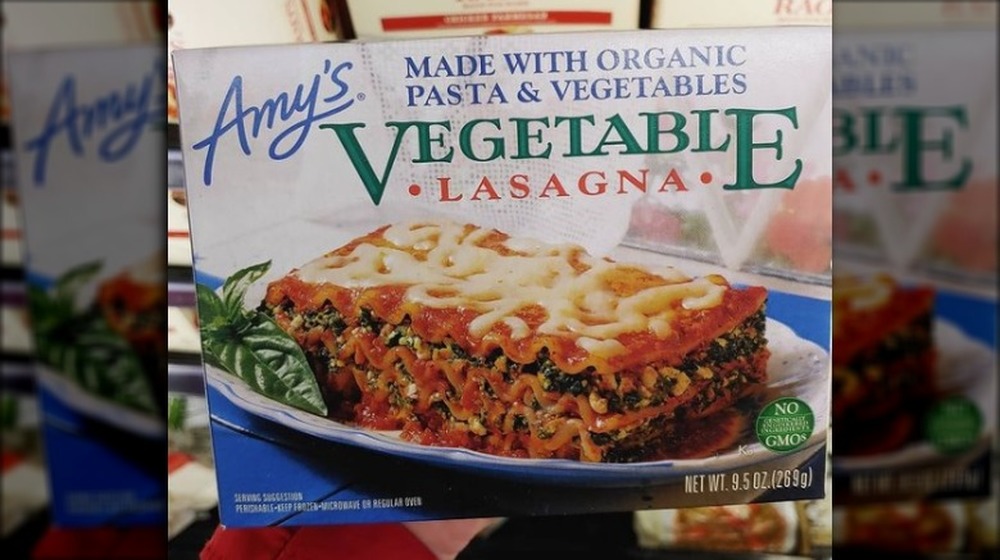Foods That Basically Disappeared In 2020
Food shortages are, in their mildest form, a frustrating situation. You head out to the store, hoping to find your favorite snack or some basic ingredients for your next elaborate meal, only to be greeted by empty shelves. It may have happened here and there before, but few of us in the United States have encountered the kinds of missing foodstuffs that we've seen in 2020.
This year hasn't given us an easy time when it comes to certain foods that have disappeared from the stores, shops, bodegas, and more. Admittedly, it could be a lot worse, the BBC notes, as food supply chains are notoriously complicated and prone to failure. Catastrophic disruptions can lead to real food shortages and even, in the worst cases, famine.
Still, you're allowed to be a bit frustrated if you can't find something as basic as a bag of flour, even when you've got other options at home. And this year especially has been a difficult one for even the most even-keeled shoppers, who have had to navigate wave after wave of foods that basically ghosted us.
Some of those foods have since returned to supermarkets. Others have yet to reappear, as producers and distributors deal with supply chains, many of which have been disrupted by the COVID-19 pandemic. Here's hoping that some of those still-missing foods can make it back soon.
Flour
For both experienced home bakers and budding bread-makers, the early months of the COVID-19 pandemic brought additional challenges. As they braved the grocery store aisles, many noticed some seriously empty shelves. For some shoppers, in fact, it was all but impossible to find flour.
The flour shortage may have been frustrating, but it provided a silver lining for businesses like King Arthur Flour. According to Marker, the relatively small flour milling company has been in continuous business since 1790 and was already known for high quality goods. In early 2020, they experienced an upswing in orders so massive that, as Adweek reports, their sales rose more than 2,000 percent. This period of time was so busy that it was briefly difficult for them to fulfill orders, as it was for many other flour producers and distributors throughout the country.
King Arthur and other companies have since beefed up their production and distribution networks have changed to accommodate demand. Yet, there was a brief moment where you may not have found much flour on your local grocery store shelf. People more or less stuck at home were forced to practice patience, or else had to get creative in the kitchen as they baked bread, pastries, and other treats.
Canned soup
While some people under stay at home orders turned to extra work in the kitchen to stay occupied, others went for more easy solutions. No judgement here, as sometimes you just want a simple meal practically ready to go as soon as you pull it out of the pantry. Yet, that option also got a little more difficult, as manufacturers of things like canned soup were overwhelmed.
MarketWatch reports that shortages of items like canned soup were still happening in the fall. General Mills, which makes Progresso soup, stated that it hadn't yet caught up to demand for the canned stuff, along with other products like cake mix and prepackaged dough. That same situation rings true over at Campbell Soup Company, which has also struggled to keep up with the amount of soup consumers have been packing into their shopping carts.
Not only have you potentially seen a dearth of canned goods in the grocery store, but you may very well see their numbers begin to dip yet again. If that happens, consider making your own soup in the meantime. It's a beginner-friendly meal for new cooks that can also be a hearty, warming dish in the cold winter months ahead.
Craft beer
Luckily, we didn't experience a complete beer shortage this year, but you may have noticed a few of your craft favorites missing from stores. That's because breweries, especially smaller ones with smaller financial cushions than the big guys, were hit hard by the COVID-19 pandemic. Statista reports that, amongst the breweries polled, more than 60 percent had to throttle back their production, while just under 30 percent had to stop making beers entirely.
The Brewers Association echoed these finds, saying that their members have seen a precipitous drop in sales over the past year. That meant layoffs, furloughs, and sluggish production, largely because of social distancing measures that have kept taprooms closed. Even if you have tried to buy beer off the premises of a brewery, chances are good that you've seen fewer brews from local makers.
Some, sadly, may have already stopped production while others are staring down the barrel of what many are calling an existential threat to the brewing industry. If you can, this could be a good occasion to go out and support your local breweries by snagging some tasty take-out beer.
Costco sheet cake
People have long been in love with the phenomenon that is the Costco sheet cake. For devotees of the wholesaler, they are a kind of delicious miracle. No matter that they come only in chocolate or vanilla. They are, by all accounts, delicious. Not to mention the fact that you can snag one in a matter of minutes, or a few more if you want them custom decorated. That, plus their under-$20 price tag is incredibly hard to beat.
Well, until recently. Not because Costco encountered a rival in the great arena of grocery store sheet cakes, but because it ran up against none other than the COVID-19 pandemic. The New York Times reports that Costco made the decision to cut back service in a few places, in order to help employees limit contact. It's an understandable decision, given the need to keep people safe, but it's still been hard to swallow.
By July, according to USA Today, some consumers were reporting that they had found the longed-for cakes in their local Costco. Now, that's no guarantee that you'll find the same near you, as Costco told reporters that the sheet cake was still shuttered for the time being. For now, let's simply say that this sign is enough for us to take hope that this sheet cake shortage is not forever.
Dunkaroos
If you happen to be of a certain age and in possession of a dedicated sweet tooth, then you may recall the heyday of Dunkaroos. The cookie and frosting combo was ultra-popular in the 1990s, proving to be the crown jewel in a kid's lunchbox. However, the snack was doomed to a slow, lingering demise, at one point buoyed along only by the sheer force of nostalgia.
Alas, even that longing for a lost childhood could only support Dunkaroos for a short while. That, and the sheer amount of sugar in the snack was pretty punishing, not to mention unpalatable to health-conscious parents and other adults. General Mills, which manufactured the treat, closed up its Dunkaroo program in 2012. Nostalgia can still be a pretty strong force and so, as Eat This, Not That! reported, Dunkaroos were actually set to make a comeback in the summer of 2020. In fact, they debuted a little earlier in the spring, as Delish says.
Great news! Except, well, where are they? Quite a few Twitter users, like Ross Miles and Michael Glow, report that they can't find the stuff in their local stores. If you're in the same unfortunate boat, that may be because, according to The Wall Street Journal, General Mills is one of many companies still struggling to shore up inventory and increase production amidst the pandemic.
Yeast
During the onset of the COVID-19 pandemic, many of the folks sheltering in their homes and limiting their grocery store visits faced the long slog of hours spent in the same space. A good portion of those people decided that, with all the extra hours inside, baking would be an appropriately time-consuming and tasty way to learn a new skill. That, and to simply pass the time.
Turns out that, since so many people had the same idea, key baking goods started disappearing from shops, leaving disconcertingly empty spots in their wake. The Atlantic reports that, even in the waning months of 2020, when suppliers have had time to respond to demand, flour is still in relatively short supply. A few months earlier, some stores had none at all.
Bread requires more than flour, however. You also need yeast, those friendly microscopic fungi that help doughs rise. However, according to Slate, yeast has also ghosted some of us. The twist here is that it's the shortage of packaging materials that have got manufacturers behind.
Now, says The Verge, you could be extra intrepid and grow your own bread starter with wild yeast that's constantly floating in the air around us. But, that takes extra time and involves constantly babysitting your starter. It will also give you sourdough, since wild yeast has bacteria piggybacking on it that adds an extra flavor punch. If that's not your style, however, you may have to wait and enjoy some flatbread in the meantime.
Oat milk
Trendy food items may fly off the shelves under normal circumstances, but this year has added an extra level of complexity courtesy of everyone's pandemic pantry stocking. According to Food & Wine, this means that, once everyone's at least tried to get things like flour, beans, toilet paper, and other more or less essential stuff, it's time for oat milk. Early on in the year, sales for the non-dairy beverage skyrocketed as people throughout the United States and beyond prepared to shelter in place for an unknown period of time.
This meant, however, that some shoppers were left bereft of oat milk. The New York Times reports that the shortage was still ongoing for various markets in the spring. The rise of oat milk in coffee shops as a non dairy alternative undoubtedly led many newly-minted home baristas to seek it out as they tried to recreate their favorite coffee shop favorites with copycat recipes. Oatly, one of the more popular brands of oat milk, has since ramped up production, meaning that some who missed their trendy not-milk have hopefully since seen it reappear in their grocery's cold case.
Ocean Spray cranberry juice
Most food disappearances are a bummer. Naturally, it's frustrating to look for it and find only emptiness where it should be under other circumstances.
If you noticed a dearth of Ocean Spray cranberry juice, however, the explanation is far more warm and fuzzy. It all begins with one man named Nathan Apodaca. As per The New York Times, Apodaca was just trying to get to work one late September morning, when his 2005 Dodge Durango died. He grabbed a longboard, his phone, and a bottle of Cran-Raspberry juice. He later posted a video of himself, skating along the highway, drinking from the Ocean Spray bottle, and lip-syncing to Fleetwood Mac's "Dreams". It was an instant viral hit that, among other things, got Apodaca a new truck filled with, yes, bottles of Ocean Spray cranberry juice.
No wonder, then, that Ocean Spray saw an immediate uptick in sales. According to CNBC, the brand, which is actually a cooperative of about 700 small farms, got a serious boost from the viral TikTok video. This is also potentially good news for cranberry farmers, who have been facing a tough year of their own. According to WBUR, cranberry growers were already facing a troubled year with unseasonably cold and then hot weather, along with decreased demand over the past decade. Combined with the coronavirus pandemic, a boost like the one offered by Apodaca's video was pretty welcome.
Odwalla smoothies
Sure, smoothies are one of those things that are relatively easy to make at home. Assuming you have a blender or even a food processor, it's really a matter of throwing in some ingredients and blending away to your heart's content. Then again, sometimes you're out and about, and it's just nice to grab a relatively healthy prepackaged smoothie from a cold case somewhere. So, why has the Coca-Cola Company decided to discontinue their Odwalla line of smoothies?
According to Eat This, Not That!, the culprit here is probably the amount of sugar that was packed into a bottle of Odwalla. On average, they contained somewhere between 30 to 50 grams of sugar. That may have put consumers off, considering the growing push for less refined, more overtly health-conscious offerings. Coca-Cola's attempt to put out a "Zero Sugar" version of Odwalla didn't seem to help matters, and sales continued to plummet. "We couldn't figure out the cost-effectiveness of it," a spokesperson told The Wall Street Journal.
Meat
Before you panic completely, it's clear now that meat has made a comeback at the grocery store and local butcher shops. Yet, for a while this year, some disappointed carnivores found that their favorite cuts of meat were nowhere to be found
Why? According to Vox, meat supply chains were significantly impacted by the COVID-19 pandemic. Workers in meatpacking plants, often crammed together in tight quarters, were disproportionately infected, leading to numerous plant closures. This in turn created a bottleneck in the supply chain, where the remaining plants that were open simply couldn't process meat fast enough. Meanwhile, farmers had to make some tough decisions about whether or not they could keep feeding their animals, which, if they were continued to be fed, could grow too large to go through most processing plants.
All of this meant that consumers, whether they were shopping at a grocery store or trying to pick up a hamburger from a restaurant, often came up against shortages and high prices. Now, as The Wall Street Journal reports, meat has returned to the butcher counter. However, a decreased demand for meat and overproduction in the face of that bottleneck has led to plenty of sales simply to move products out of the store. That may be good news for shoppers, but it's still got farmers worried.
Frozen pizza
Listen, there's no judgement here. We're all for doing it yourself, whether that's baking your own bread, blending your own smoothies, or assembling your own pizzas. Heck, you can even make your own pizza dough pretty easily. Then again, there are simply some nights where you need a break. If you so choose to snag a frozen pizza on your next shopping trip, storing it in anticipation of at least one easy dinner, it's fine. If you promise not to tell pizza purists, there are even some frozen pizzas that are really good.
That is, if you can get your hands on one. In April, Ad Week reported that frozen pizzas had become something of a rarity, despite dramatically increased production nationwide. A four-week measure of the situation from late March into early April showed that Americans bought an estimated $275 million worth of frozen pizzas in that time. Analysts have pointed to the obvious culprit for many food shortages this year: the coronavirus pandemic. Presumably, shoppers who have been quick or lucky enough to grab a frozen pizza before they were gone from the freezer just wanted a simple, comforting meal while they were stuck at home.
Amy's Kitchen frozen meals
Vegans and vegetarians, much like their meat-eating compatriots, sometimes want a meal that's simple and easy to prepare. Their somewhat unique dietary restrictions didn't save them from yet another slate of food disappearances in 2020, however. Veggie-friendly frozen foods brand Amy's Kitchen, long a favorite of time-crunched vegetarians, has also been impacted by shortages and decreased demand.
It's gotten difficult enough that, as Bloomberg reports, the brand has scaled back and even eliminated some of its offerings. The culprit is, perhaps now unsurprisingly, the COVID-19 pandemic. As with so many other food industries, production and distribution has been impacted by supply-chain disruptions and new consumer purchasing patterns. Manufacturers also have to face restrictions like social distancing, which keeps workers safer but can affect what's made in a factory and how often it rolls off the line.
For Amy's Kitchen, this means that they've had to enact new measures in an effort to keep things afloat, including reducing their output from 228 products to a mere 71. Shoppers looking for a particular frozen vegan burrito or other meal from Amy's Kitchen may be out of luck for the foreseeable future.

